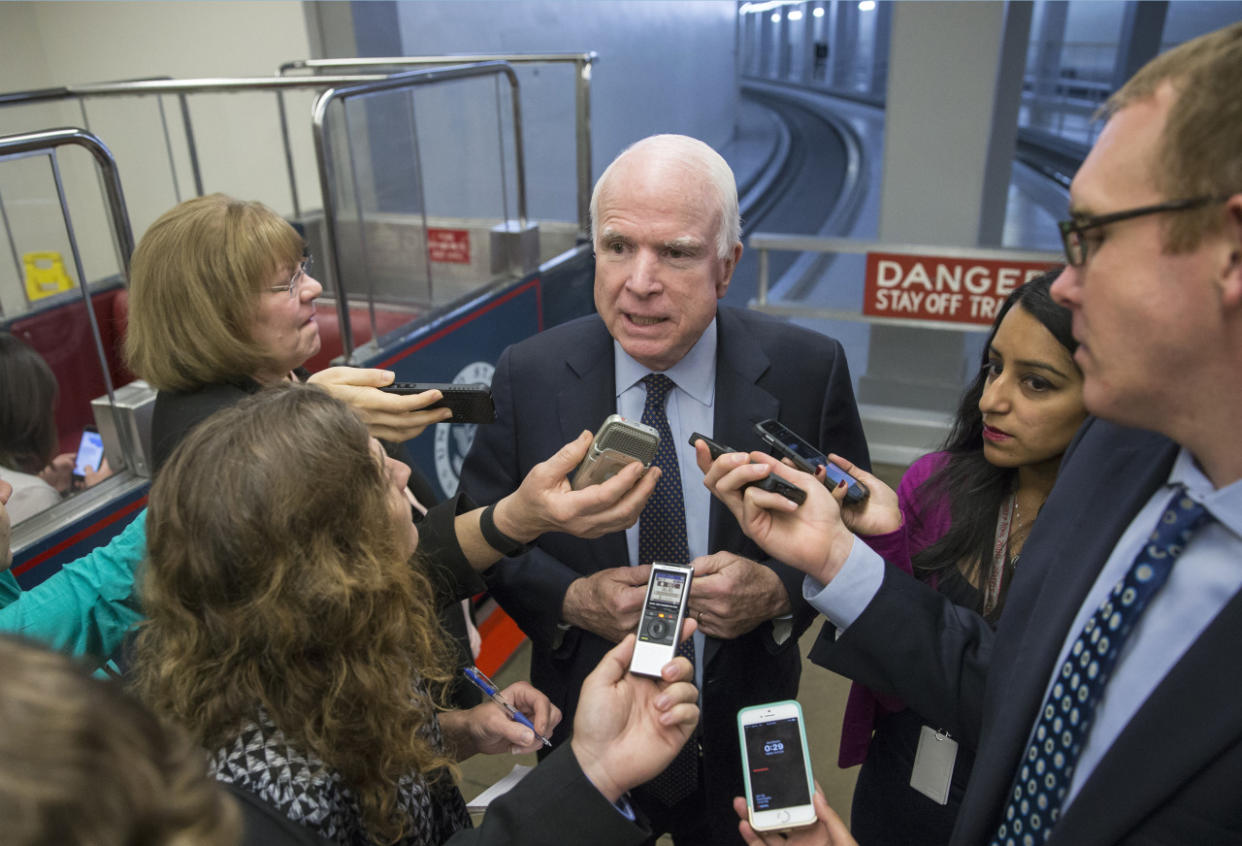McCain: Tea party ‘appeals to the bad angels of our nature’

Reporters surround Senate Armed Services Committee Chairman Sen. John McCain on Capitol Hill on Tuesday. (Photo: J. Scott Applewhite/AP)
Sen. John McCain, R-Ariz., would not criticize current GOP presidential frontrunner Donald Trump outright, no matter how hard reporters tried, at a media breakfast here in Washington on Wednesday. But he did warn that the tea party movement is in part fueled by appealing to “the bad angels of our nature” and that candidates who do not correct racist sentiments or untrue statements on the trail are “complicit” in propagating them.
Speaking at a breakfast hosted by the Christian Science Monitor, McCain said that much of the anti-establishment sentiment against Republicans from their conservative base is “justified” because those voters have not seen the sort of economic benefits they have expected to see since the crash of 2008. He noted that only “very wealthy people have done very well.” Yet he also offered several candid diagnoses of what he characterized as a darker side of the elements that have taken over the GOP and propelled nonpolitician candidates like Trump and neurosurgeon Ben Carson to the top of the field.
“If you go back to 2010, when the tea party became a real factor, at least in certain segments of the political landscape, it’s a reflection of frustration and anger that people feel,” McCain said. “A lot of that is bred by a poor economy, as far as its effect on average American citizens, and a lot of it is justified because they have not seen a betterment of their lives that they had hoped to expect.”
McCain, the 2008 GOP presidential nominee, then added a pretty serious addendum to that widely accepted explanation of the tea party’s roots: “I think also — I probably shouldn’t say this — but some of this appeals to the bad angels of our nature rather than the better angels of our nature.”
When he was campaigning for president in 2008, McCain caught flak from the conservative base — and even attendees at his own events — for defending now-President Obama against charges from town hall attendees that the Democrat was Arab, un-American and a “terrorist.”
“He’s a decent family man [and] citizen that I just happen to have disagreements with on fundamental issues, and that’s what this campaign’s all about. He’s not [an Arab],“ McCain said at the time.
When asked whether more Republican candidates in the 2016 race should follow his example and not let incendiary comments stand, McCain adamantly defended his approach in 2008 and urged others to adopt it. Those who do not correct wrong views are “complicit,” said McCain, and will ultimately lose, even if they win electorally.
“In my view, if you allow those things to be said — or not, in the case of beating up a protester — and let that go unresponded to, you are complicit,” McCain said. “You have to do what’s right. No matter what the cost is, you have to do what’s right. Otherwise you will lose in the long run, even if you win, you lose, speaking as the loser. You just must have a level of political discourse.”
It’s not clear that those in the current crop of GOP contenders will heed his advice. But McCain’s comments provided a reminder of how far the Republican party has shifted since McCain last ran for president and how antiquated, at least for now, his take might seem to those in the movement that now dominates the GOP.
Even so, McCain — who faces Senate reelection in 2016 — spent much of the breakfast questioning Obama’s leadership and strategy in attacking the Islamic State in Syria. And he told reporters that he plans to vote this week in the Senate to repeal Obamacare, though he conceded “discomfort” with supporting a package that would roll back Medicaid expansion, which was implemented in Arizona by its governor and legislature.

